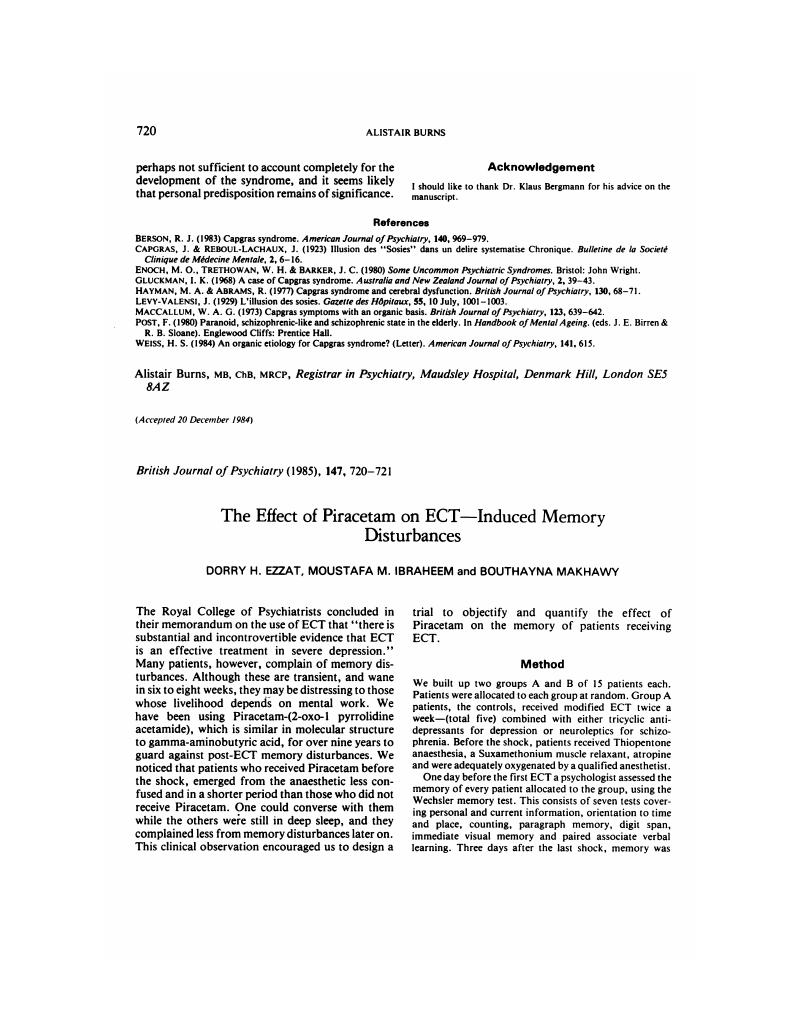Crossref Citations
This article has been cited by the following publications. This list is generated based on data provided by Crossref.
Franklin, Stanley R.
Sethy, Vimala H.
and
Tang, Andrew H.
1986.
Amnesia produced by intracerebroventricular injections of hemicholinium-3 in mice was prevented by pretreatment with piracetam-like compounds.
Pharmacology Biochemistry and Behavior,
Vol. 25,
Issue. 4,
p.
925.
Mondadori, Cesare
and
Petschke, Friedel
1987.
Do piracetam-like compounds act centrally via peripheral mechanisms?.
Brain Research,
Vol. 435,
Issue. 1-2,
p.
310.
Keim, Kevin L.
and
Hall, Pauliana C.
1987.
General neuropharmacology of vinpocetine: A putative cerebral activator.
Drug Development Research,
Vol. 11,
Issue. 2,
p.
107.
Moos, Walter H.
Davis, Robert E.
Schwarz, Roy D.
and
Gamzu, Elkan R.
1988.
Cognition activators.
Medicinal Research Reviews,
Vol. 8,
Issue. 3,
p.
353.
McGuire, Brian E
1990.
Review article : Psychopharmacological treatments for memory impairment.
Clinical Rehabilitation,
Vol. 4,
Issue. 3,
p.
235.
Khan, Arifulla
Mirolo, Mary Helen
Mirolo, Hugh A.
and
Miller, Sheree
1993.
Can ECT-induced cognitive effects be altered pharmacologically?.
Progress in Neuro-Psychopharmacology and Biological Psychiatry,
Vol. 17,
Issue. 6,
p.
861.
Joseph, Jerry
Venkataraman, B.V
Naga Rani, N.A
and
Andrade, Chittaranjan
1994.
BR-16A protects against ECS-induced anterograde amnesia.
Biological Psychiatry,
Vol. 36,
Issue. 7,
p.
478.
Ventra, Carmelo
Grimaldi, Maurizio
Meucci, Olimpia
Scorziello, Antonella
Apicella, Antonio
Filetti, Emilio
Marino, Adriano
and
Schettini, Gennaro
1994.
Aniracetam improves behavioural responses and facilitates signal transduction in the rat brain.
Journal of Psychopharmacology,
Vol. 8,
Issue. 2,
p.
109.
Christoffersen, Gert R.J
Kemp, Anne
and
Örlygsdottir, Gudbjörg
1998.
Piracetam inhibits Pavlovian extinction and reversal learning in a spatial task for rats.
Neuropharmacology,
Vol. 37,
Issue. 6,
p.
815.
Prudic, Joan
Sackeim, Harold A
and
Spicknall, Kerith
1998.
Potential Pharmacologic Agents for the Cognitive Effects of Electroconvulsive Treatment.
Psychiatric Annals,
Vol. 28,
Issue. 1,
p.
40.
Tang, Wai-Kwong
and
Ungvari, Gabor S.
2001.
Asystole During Electroconvulsive Therapy: A Case Report.
Australian & New Zealand Journal of Psychiatry,
Vol. 35,
Issue. 3,
p.
382.
Anand, Arun
Andrade, Chittaranjan
Sudha, S.
Guido, Shobha
and
Venkataraman, B. V.
2001.
Phenylephrine and ECS-Induced Retrograde Amnesia.
The Journal of ECT,
Vol. 17,
Issue. 3,
p.
166.
Tang, Wai Kwong
Ungvari, Gabor S.
and
Leung, Henry Chi Ming
2002.
Effect of Piracetam on ECT-Induced Cognitive Disturbances: A Randomized, Placebo-Controlled, Double-Blind Study.
The Journal of ECT,
Vol. 18,
Issue. 3,
p.
130.
Kampman, Kyle
Majewska, Maria Dorota
Tourian, Karen
Dackis, Charles
Cornish, James
Poole, Sabrina
and
O'Brien, Charles
2003.
A pilot trial of piracetam and ginkgo biloba for the treatment of cocaine dependence.
Addictive Behaviors,
Vol. 28,
Issue. 3,
p.
437.
Pigot, Melissa
Andrade, Chittaranjan
and
FRANZCP, Colleen Loo
2008.
Pharmacological Attenuation of Electroconvulsive Therapy-Induced Cognitive Deficits.
The Journal of ECT,
Vol. 24,
Issue. 1,
p.
57.
Gregory-Roberts, Emily M.
Naismith, Sharon L.
Cullen, Karen M.
and
Hickie, Ian B.
2010.
Electroconvulsive therapy-induced persistent retrograde amnesia: Could it be minimised by ketamine or other pharmacological approaches?.
Journal of Affective Disorders,
Vol. 126,
Issue. 1-2,
p.
39.
Kellner, C.H.
Adams, D.A.
and
Benferhat, A.
2015.
Further improving the cognitive effect profile of electroconvulsive therapy (ECT): The case for studying carbamylated erythropoietin.
Medical Hypotheses,
Vol. 84,
Issue. 3,
p.
258.
Rasmussen, Keith G.
2019.
Principles and Practice of Electroconvulsive Therapy.
2019.
Principles and Practice of Electroconvulsive Therapy.
p.
257.
Verdijk, Joey P.A.J.
van Kessel, Mike A.
Oud, Matthijs
Kellner, Charles H.
Hofmeijer, Jeannette
Verwijk, Esmée
and
van Waarde, Jeroen A.
2022.
Pharmacological interventions to diminish cognitive side effects of electroconvulsive therapy: A systematic review and meta‐analysis.
Acta Psychiatrica Scandinavica,
Vol. 145,
Issue. 4,
p.
343.




eLetters
No eLetters have been published for this article.